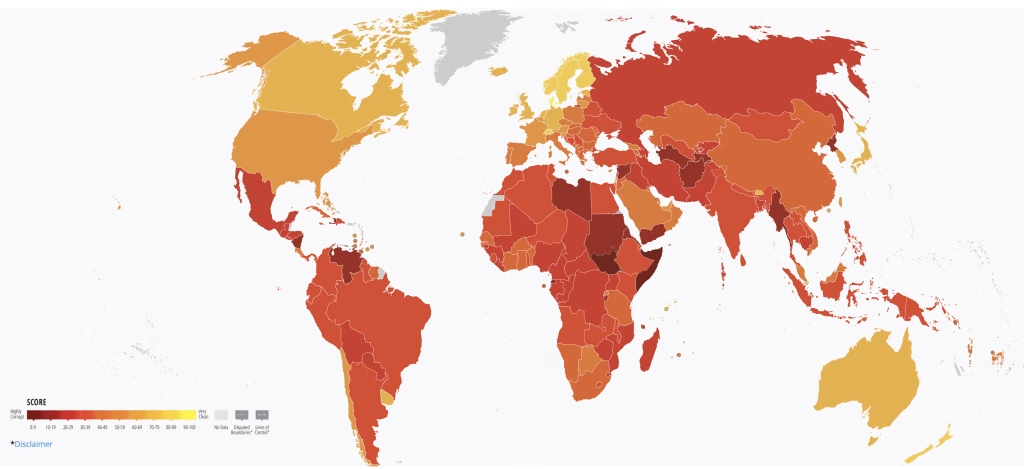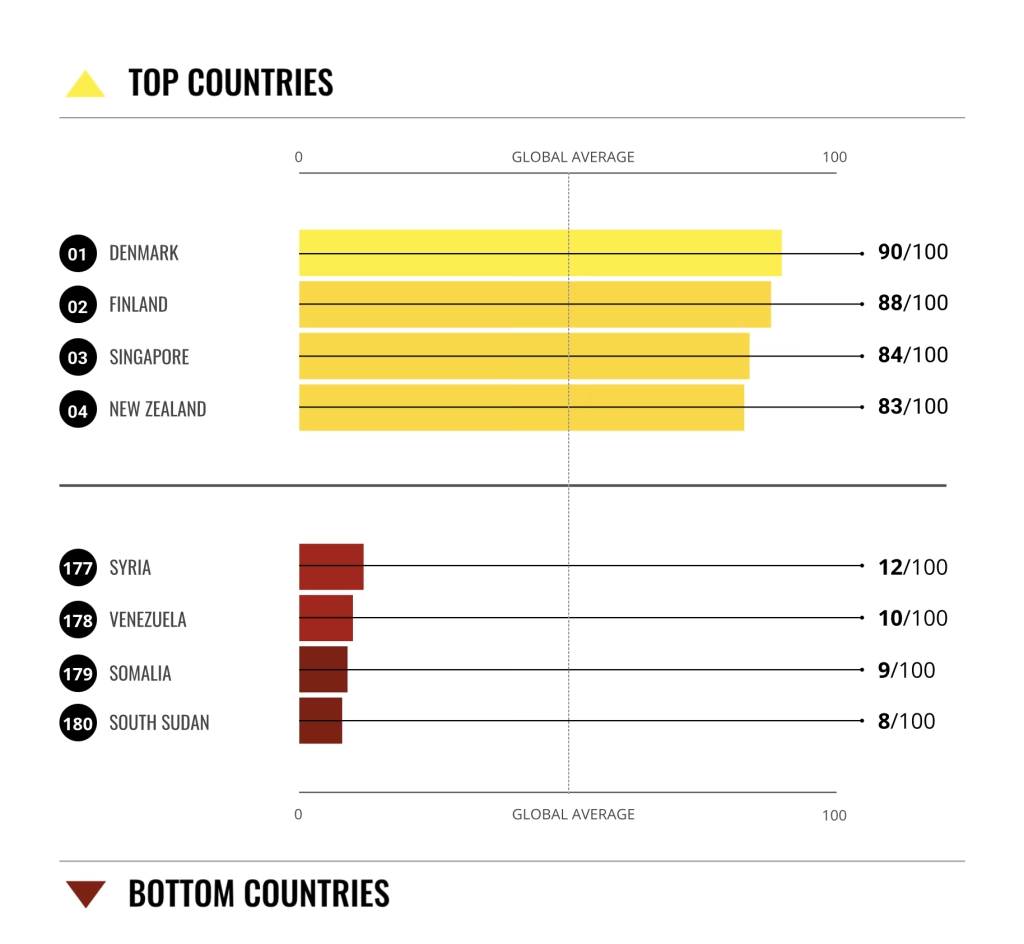Corruption Corodes
Looking at comparative corruption and development.

As James Joyner noted this morning, the Trump administration is cleaving pretty heavily to a pro-corruption direction. This is manifesting in things like a “pause” on prosecuting the Foreign Corrupt Practices Act. In the comment thread, a question emerged as to whether there was a case to be made for things like bribery since we can find examples of such elsewhere in the world.
An initial thought is that whenever bribery is an accepted practice, this just tends to result in officers charged with enforcing rules (whether they be traffic laws or building codes, to name just two examples) focusing more on enriching themselves than on doing the jobs they are supposed to be doing. A police officer who can extract bribes from motorists is going to be focused on finding easy marks to help line his pockets rather than actually properly enforcing traffic laws. And certainly, it shouldn’t be hard to game out what happens when building inspectors (or health inspectors, food inspectors, etc.) are on the take.
But, I don’t have to reinvent the wheel on this topic. There is a lot of literature on the subject. The work of Stephen D. Morris, now professor emeritus from MTSU whom I knew for years from various conferences we both attended, which focused on political corruption in Mexico comes to mind. And he is just one example. More to the point there are groups like Transparency International, which publishes an annual report on global corruption including its Corruption Perceptions Index, which ranks all the countries in the world on this topic.
The CPI ranks 180 countries and territories according to the levels of public-sector corruption perceived by experts and businesspeople. It relies on 13 independent data sources and uses a scale of zero to 100, where zero is highly corrupt and 100 is very clean.
Why might corruption matter?
The index highlights the stark contrast between nations with strong, independent institutions and free, fair elections, and those with repressive authoritarian regimes. Full democracies have a CPI average of 73, while flawed democracies average 47 and non-democratic regimes just 33. This highlights that although some non-democratic countries might be perceived as managing certain forms of corruption, the broader picture shows that democracy and strong institutions are crucial for combatting corruption fully and effectively.
This really shouldn’t be a shock. Do you want your accountant to be corrupt, or honest? You banker? Your lawyer? Your doctor? The list is endless.
Now, I suppose that someone will note, like Jesse Pinkman did in Breaking Bad, that sometimes you want not a criminal lawyer, but, in fact, a criminal lawyer. But keep in mind he was trying to get a petty meth dealer out of jail.
Most of us want to deal with honest people and for obvious reasons.
Regardless, one need only look at the CPI to note the kinds of countries that are towards the top, in terms of economic success, political liberty, and general living standards versus those at the bottom.

Trump’s actions will take us down the list and will do so in a way that will damage our society, politics, and economy.
Much more at the link.
I’m in the middle of a Hell week resurgence and have no time to comment here.
Quick point: small scale corruption is far more damaging to society. I mean when people regularly expect to be shaken down by cops, bureaucrats (DMV, passports, etc.), even road repair crews and service personnel here and there.
This above most everything else led Mexico to enact democratic reforms.
High level corruption is as bad as ever. It affects the economy a lot more, but people neither notice it nor know much, if anything, about it.
If you set aside the ethics for a minute, (someone who has the time and inclination can explain the concept of ethics to our right wing brothers) I have to wonder how practical it is to move your business to a country where bribes are the norm? As Dr Taylor has shown, countries that engage in a lot of corruption dont prosper. Does a US company that plans to move to a highly corrupt country now that Trump has made it legal really expect that they will pay that bribe only once? That it wont get ratcheted up as once they commit real money to an area it gets leverage against them?
Also, shouldn’t they update the map and put a black dot over Washington, DC now?
Steve
Another part of this is that the FCPA makes life a lot easier for companies in the US doing things abroad. If someone asks for a bribe, they can just say “Sorry, can’t, my lawyer won’t allow it,” or whatever. And then you can come in with a lower bid than a company that’s giving a bribe, because they have to work the cost of the bribe into the contract.
That excuse just got a lot weaker, although at least the statute of limitations is 5 years, so the next administration could decide to prosecute companies that gave bribes.
Misspelled engaging in revenue collection for the State.
@Paul L.: If it makes you feel any better, I would rather traffic cops patrol and deal with actual problems and not write tickets.
Don’t sit in a speed trap. Instead, drive around and people will slow down.
(But kudos on basically ignoring the underlying point of the post to feed your monomania!).
Imposing corruption on media along the road to totalitarianism.
Minor correction:
High level corruption in Mexico is as bad as usual, but as it ever was. That happened in the term of Jose Lopez Portillo (aka El Jolopo) between 1976 and 1982. You can get a sense of if by whom he appointed as chief of the Mexico City police.
Low level corruption has decreased, at least in some areas. No one expects to be shaken down for a bribe when getting a drivers license, passport, or any other common documents. The police do still try, but not always.
A bigger problem is the police/military corruption involving drug dealers.
@Rob1:
Trumps is nuts, delusional, off the reservation, this “Gulf of America” nonsense is a petty example.
And the press and pols just dance around it, can’t bring themselves to say the obvious while accommodating it.
On another tangent, remember the apoplexy on the right whenever a democratic administration said that it was going to de-emphasize (not even ‘pause’) enforcement of some dumb law? Yet again, we see that conservatives have no actual principles — they no longer even give lip service to the idea that the rules should be the same for everyone.
@charontwo: Gulf of America thing is petty. Using the power of the office to bend media to your will, not so petty. Watch this POTUS sanctioned intolerance expand outward; mainstream media, pop culture outlets, social media. Pretty soon, the impact isn’t petty anymore
@Kathy: Your reference to Portillo reminded me of a line from Eduardo Galeano’s Memory of Fire:
But yeah, I’m willing to concede that Trump and American owners of capital need the advantage that bribery in foreign countries offers. Why the fwk not?
Whatever, Donny.
Doesn’t this just paint a big target on American companies, telling every corrupt government that they can shakedown American companies for bribes, as they’re legal now?
@Rob1: Of course it’s serious, not implying otherwise.
The notorious quote from George Orwell, 1984:
Just pointing out that Trump and Musk are out of their minds, besides all their other mental or neurological health issues. And worse, the media and politicians are too frightened or complicit to point out the obvious, like the fable of the emperor’s new clothes.
@just nutha:
The other thing about legalizing bribes, is that they then become deductible business expenses.
@Paul L.:
This is correct, though we should note that “State” here usually means the either municipality or county. We should also note that fees and fines are typically a way of keeping local taxes low or non-existent.
To be clear, I’m not advocating for “for-profit” policing–it’s something I think ultimately harms everyone. It’s a reminder that it’s as much a policy decision (usually tied to shifting the burden of taxation onto more vulnerable people) as anything else.
@Kathy: Exactly! And everyone knows that businesses always pass on these cost reductions to consumers in the form of lower prices and to shareholders as dividends. EVERYBODY WINS! [eyeroll emoji]
Well, you gave the arguments I was thinking of, only better. You brought citations and data. Well done. I have a hard time believing anyone takes the position “bribery is good!”. But then, of course someone does. It’s kinda like Rule 34.
I have been pondering if it even makes sense to debate certain topics. For instance, whether gender dysphoria is real or not.
If someone said that in my home, I wouldn’t argue with them, I would ask them to leave. Saying that is an insult, and I will not tolerate it. To debate sends a process message that there is some substance to it.
There’s some nuance. Some folks are curious, seeking. They don’t understand. I was once in that category. So I am happy to tolerate it. Others have their mind made up and are simply propagandists and/or shitposters.
I am not interested in debating shitposters.
And finally, I will quote Ta-Nehisi Coates, one of the best things he ever wrote on his blog,
“My basic humanity is not up for debate”.
Qualified, Prosecutorial and Judicial Immunity.
@Paul L.: They probably mean before the President pardoned hundreds of violent criminals, but point taken that pardoning is an unfortunate loophole that is not used as originally intended.